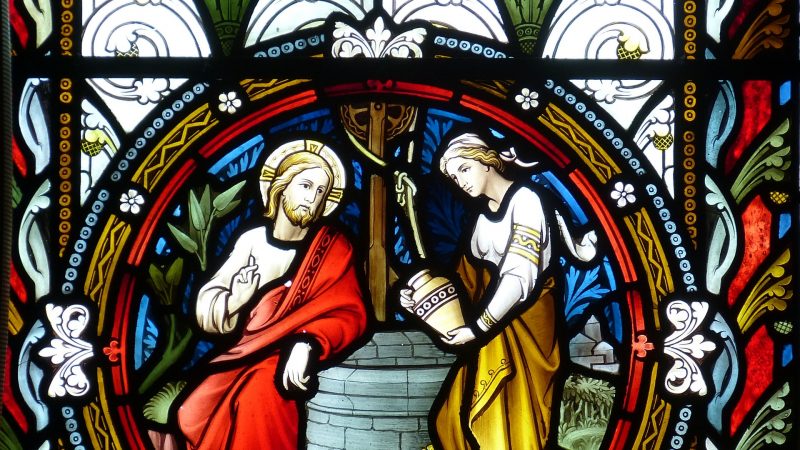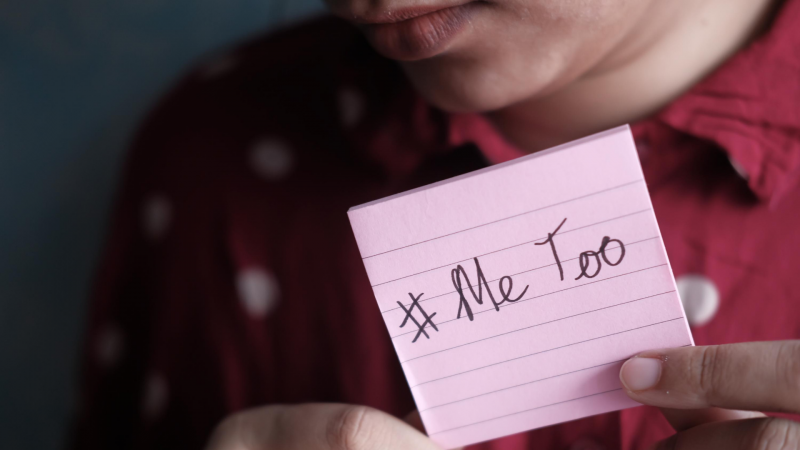Youth Resource
Human Dignity: Gender Equality
The videos, articles, and suggested activities in this Classroom Resource explore the mixed role of the Christian church in promoting gender equality – and how biblical ideas of universal human dignity and equality speak powerfully against discrimination on the basis of gender.
You may also want to include this segment from the For the Love of God documentary in this lesson, and/or incorporate ideas from this Classroom Resource from the For the Love of God series. There is some overlap between the concepts in that Classroom Resource and this one.
Videos
-
On whether Christianity is good or bad for women
Catherine Brekus says it has been both.
Transcript
People often ask me whether Christianity should be understood as oppressive for women or as liberating for women. The answer is always both because Christianity is multiple. I think we have to speak about Christianities in the plural, rather than Christianity in the singular.
Having said that, it is clear to me that Christianity has been a major force for women’s activism; Christianity has been the way that women have voiced their opposition to oppression; and that Christian women have argued again and again that God wants men and women to be equal. And they make that claim on the grounds of the highest authority possible for them, and that’s the authority of God.
close -
On the church’s mixed record on women
John Stackhouse explains how sexist Christians have been – and how that’s not the whole story.
Transcript
The history of the Christian church, and gender relations and the treatment of women, is on this hand and on the other hand. On this hand, the Christian church almost everywhere, almost always, has been sexist in the sense of treating women worse than men simply because they’re women rather than men. Which I think is a pretty good rough definition of sexism.
At the same time, for all of its faults, Christian civilisation has generally been a safer, better place for women than any of the alternatives. If you look through the centuries, would you rather be in Christian civilisation, or would you rather spin the globe and be somewhere else? Generally you want to be in Christian civilisation, however bad it is.
And secondly, it has been only Christian civilisation in the modern era that has taken, eventually for granted, the full equality of women. Again, that’s just not anywhere else in the history of the world so far as we know.
So it’s a bit of a “on the one hand, on the other hand” kind of story. Christianity is still pretty sexist, until the modern era. On the other hand, it ameliorates the role of women so that it’s actually better for women in Christian civilisation than it is pretty much anywhere else.
close -
On what Christianity promised women
Sarah Coakley comments on the tension between what Jesus made possible and how that played out in church life.
Transcript
So if there’s so much bad news about patriarchy and Christianity, what has Christianity contributed for women?
First and foremost, the teaching of Jesus set before women the possibility of – I think – truly equal treatment. It’s true that Jesus did not choose women technically to be amongst his 12 disciples, but nonetheless he had women followers who were with him throughout his teaching career, by all accounts were the ones who didn’t abandon him when his male disciples fled, and played an extraordinarily important role – especially Mary Magdalene – in the promulgation of the resurrection.
But you see very soon after Jesus’ resurrection and ascension women’s roles being as it were reallocated, even though women clearly played extraordinarily important undertakings within the earliest Pauline churches. So running through the Pauline corpus is this huge ambiguity as Paul himself and his immediate followers begin to wonder whether the end is going to come and whether Jesus is going to return imminently. And there’s that continuing egalitarian propulsion expressed in Galatians 3:28; and at the same there are local accommodations to the mores of the time which re-subordinate women, as in 1 Corinthians 11 for instance, which caused enormous trouble to early church commentators.
So the lesson here is that, in its inception, Christianity set before women a true possibility of complete transformation on equal terms alongside men. But at the same time it very quickly accommodated itself into existing religious and cultural mores. And you could say that that tension has been played out since then.
close -
Why Jesus is good news for women
In this clip from the 2017 Richard Johnson Lecture, Amy Orr-Ewing explains how Jesus affirms the full humanity of women.
Transcript
AMY ORR-EWING: And so the question comes to us this evening: What will we do with the testimony and witness of those first women who have passed on to us the story of the incarnation of God, his atoning death, and his resurrection? And in our context of women objectified as objects, susceptible to self-objectification, and increasingly pursued as targets of sexual aggression, the humanity of women is what is at stake. And it is into precisely that question that Jesus Christ speaks, upholding the Genesis ideal of male and female, created in the image of God. Human life is sacred, precious, having transcendent value as male and female. Christ enacted that truth in his treatment of women.
So when we see that religion, or Christianity in particular, has been patriarchal, or has been invoked to justify abuse of women, we need to ask ourselves a really important question: Is that violence a logical outworking of this worldview? Jesus was radically countercultural in his positive treatment of women. Patriarchy is not a logical outworking of his teachings, and that is why faithful Christians in every generation have resisted it.
You know, truth matters. Ideas have consequences. If male and female are equal image bearers of the divine image, underpinning the sacredness of human life, the outworkings of that will be practical. In the same way that if we’re just slime, here by chance, the strong having eliminated the week, there is no reason to be overly concerned about domination or subjugation – we just need to make sure we’re not on the receiving end of it. The specifics of life are directly impacted by the patterns, the worldviews, that we apply. If, rather than male and female equally reflecting the image of God in their shared humanity, women and men are both demeaned by a reductionist view of women as a separate class, economically dependent on men or restricted in their spheres of activity or creativity, on the basis of arbitrary cultural prejudice.
The Christian claim is that a divine pattern for humanity, male and female, equally human, reflecting the image of God is upheld in the ministry of Jesus. God incarnate in human history, invited women to be first at the cradle and last at the cross. And he underpins therefore an expansive vision of human flourishing, in which the value of all human life is underpinned by this transcendent source. Where the church has failed women, Christ as the truth incarnate gave humanity the perfect pattern as to how to affirm the full humanity of women.
On one level, we shouldn’t be surprised to be disappointed by Christianity. After all, my great friend Dr Elaine Storkey points out, the church recruits from the human race. We perhaps ought not to be surprised or shocked by the negative behaviors of institutions and individuals. But I suggest to you this evening that you will not be disappointed by Christ. The promise of Christ is that coming to know him is the key, and that real change is possible when it is wrought by him. Many people may claim to represent him, but we can test whether that rings true – and in this era of fake news, we all resonate with that instinct to rigorously check our sources. Is Christianity bad news for women? Is it bad news for human beings? We need to check the sources for ourselves. We may be surprised by what we discover.
close -
On Jesus’ conversations with women
Lynn Cohick says that, unusually for his time, Jesus took women seriously.
Transcript
The role of women in Jesus’ life is a very interesting topic. I think probably the most stunning thing about Jesus and his relating to women that he met is that he treated them like regular people. They had likes and dislikes. Most of all, he could see that many of these women had real religious questions, and he treated them seriously.
It’s remarkable to me that two of the most theologically rich conversations that Jesus has are with women. In fact, one of them is with a Samaritan woman, as they talk about and she asks him questions about Messiah. And at the end he says to her something that would have been really difficult to wrap your mind around in the ancient world, he says to her that soon all people will worship God in spirit and in truth. Now this is a time when everybody goes to temple – whether you’re Jew, Gentile, Samaritan. And you expect to give sacrifices, whether it’s a grain offering or an animal offering, you give sacrifices. And here is Jesus telling a Samaritan woman that, in the coming days, everyone will worship God in spirit and in truth. And she gets it. She runs back to her town and tells everyone I think this is the Messiah.
Another time, Jesus is talking with a woman, Martha, and they’re talking about the resurrection of the dead. And that’s a belief that Pharisees, a group of Jews at this time, they hold it; another group of Jews, the Sadducees, they don’t believe in resurrection of the body. And so it’s a Jewish conversation that’s happening, and Martha knows about it. And Jesus says to her, “I am the resurrection and the life”. That’s an amazing truth! And she gets it. And they have a conversation about it.
I see Jesus giving dignity to women as thinking, feeling, real humans.
close
Articles
-

International Women’s Day
Simon Smart reflects on how the rise of Christianity – with its vision of what it means to be human – has helped women to flourish.
-

The forgotten religious roots of #MeToo
Justine Toh explores the surprising Christian origins of the #MeToo movement.
-

The un-silencing of the girls has been a long time coming
Justine Toh comments on sexual abuse scandals, women speaking up, and the revolution of human dignity ushered in by Christianity.
-

People just like you
In light of the Instagram poll highlighting the prevalence of sexual assault in high schools, Anna Grummitt asks: what can be done?
Engage
- Choose a colour, create a symbol, and sketch an image to describe your reactions to one of the following ABC News headlines:
- Norway’s beach handball team fined for breaching uniform requirements by not wearing bikini bottoms
- Gender pay gap narrowing but women still earning average of $25,000 less
- One in three women has had health concerns dismissed. Experts say it’s evidence of a gender gap in medicine
- Out of 10, what score would you give Australia when it comes to gender equality? Explain your reasons.
- Using this table, brainstorm some positive and negative contributions of Christianity to women’s rights.

Understand & Evaluate
- Watch the videos On whether Christianity is good or bad for women; On the church’s mixed record on women; and On what Christianity promised women and read Simon Smart’s International Women’s Day column.
- Use information from these videos and columns to add to your positives/negatives table above.
- Are these videos mostly positive or negative in their assessment of the role Christianity has played in advancing women’s rights? How do you feel about their assessment?
- Read Justine Toh’s articles The forgotten religious roots of #MeToo and The un-silencing of the girls has been a long time coming. What do we learn from these articles about:
- The place of women in the Greco-Roman world
- How Christianity challenged the Greco-Roman treatment of women
- The influence Christian teachings have had on women’s rights movements today
- Watch the clip from CPX’s 2017 Richard Johnson Lecture where Amy Orr-Ewing shares Why Jesus is good news for women. Using the transcript of the video, highlight three sentences that stand out to you that you think are particularly important for her argument. Share the sentences you chose with another student.
- Read Anna Grummitt’s column People just like you. Make a list of some of the ways society might change if everyone saw women – and all people – as bearing God’s image.
Bible Focus
- Read Genesis 1:26-28 and Galatians 3:26-28. How do these verses specifically highlight the inherent equality between men and women?
- Watch the video On Jesus’ conversations with women. Choose one of the characters Lynn Cohick mentions (the Samaritan woman or Martha) and read the passage she references (John 4:1-26 or John 11:1-44).
- Do the Step Inside Thinking Routine for the woman in the story:
- What can this person see, observe, or notice?
- What might this person know, understand, hold true, or believe?
- What might this person care deeply about?
- What might this person wonder about or question?
- What impression do you get about the way Jesus related to women from the passage you chose?
- Do the Step Inside Thinking Routine for the woman in the story:
Apply
- Imagine you have been asked to write a 5-minute speech on the role of Christianity in the progression of gender equality.
- Prepare the text of your speech, including some of the concepts from this lesson.
- Create at least three PowerPoint slides that you could use in your speech
- How would you respond to a friend who said to you ‘I would never consider Christianity because of the way it has treated women’?
Extend
- Watch or listen to the whole of CPX’s 2017 Richard Johnson Lecture with Amy Orr-Ewing and the accompanying Q&A session, and answer the following questions:
- What did you find helpful about the lecture
- What (if anything) did you feel was missing from her argument?
- What is one question you would like to ask the speaker?
- Read this article by prominent atheist Jane Caro Religion v feminism: Which has done more for humanity? and write a paragraph responding to her argument.


